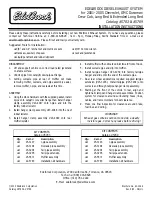
Cadillac CTS/CTS-V Owner Manual (GMNA-Localizing-U.S./Canada/Mexico-
11349156) - 2018 - CRC - 5/9/17
LIGHTING
151
2
:
Turns on the headlamps together
with the parking lamps and
instrument panel lights.
IntelliBeam
®
System
If equipped, this system turns the
vehicle's high-beam headlamps on and
off according to surrounding traffic
conditions.
The system turns the high-beam
headlamps on when it is dark enough
and there is no other traffic present.
This light comes on in the instrument
cluster when the IntelliBeam system
is enabled.
Turning On and Enabling IntelliBeam
To enable the IntelliBeam system,
with the turn signal lever in the
neutral position, turn the exterior
lamp control to AUTO. The blue
high-beam on light appears on the
instrument cluster when the high
beams are on.
Driving with IntelliBeam
The system only activates the high
beams when driving over 40 km/h
(25 mph).
There is a sensor near the top center
of the windshield, which automatically
controls the system. Keep this area of
the windshield clear of debris to allow
for best system performance.
The high-beam headlamps remain on,
under the automatic control, until one
of the following situations occurs:
.
The system detects an
approaching vehicle's headlamps.
.
The system detects a preceding
vehicle's taillamps.
.
The outside light is bright enough
that high-beam headlamps are not
required.
.
The vehicle's speed drops below
20 km/h (12 mph).
.
The Intellibeam system is disabled
by the high/low-beam changer or
the flash-to-pass feature. If this
happens, the high/low-beam
changer must be activated two
times within two seconds to
reactivate the Intellibeam system.
The instrument cluster light will
come on to indicate the
Intellibeam system is reactivated.
See
and
The high beams may not turn off
automatically if the system cannot
detect other vehicle's lamps because
of any of the following:
.
The other vehicle's lamp(s) are
missing, damaged, obstructed from
view, or otherwise undetected.
.
The other vehicle's lamp(s) are
covered with dirt, snow, and/or
road spray.
.
The other vehicle's lamp(s) cannot
be detected due to dense exhaust,
smoke, fog, snow, road spray, mist,
or other airborne obstructions.
.
Your vehicle's windshield is dirty,
cracked, or obstructed by
something that blocks the view of
the light sensor.
















































